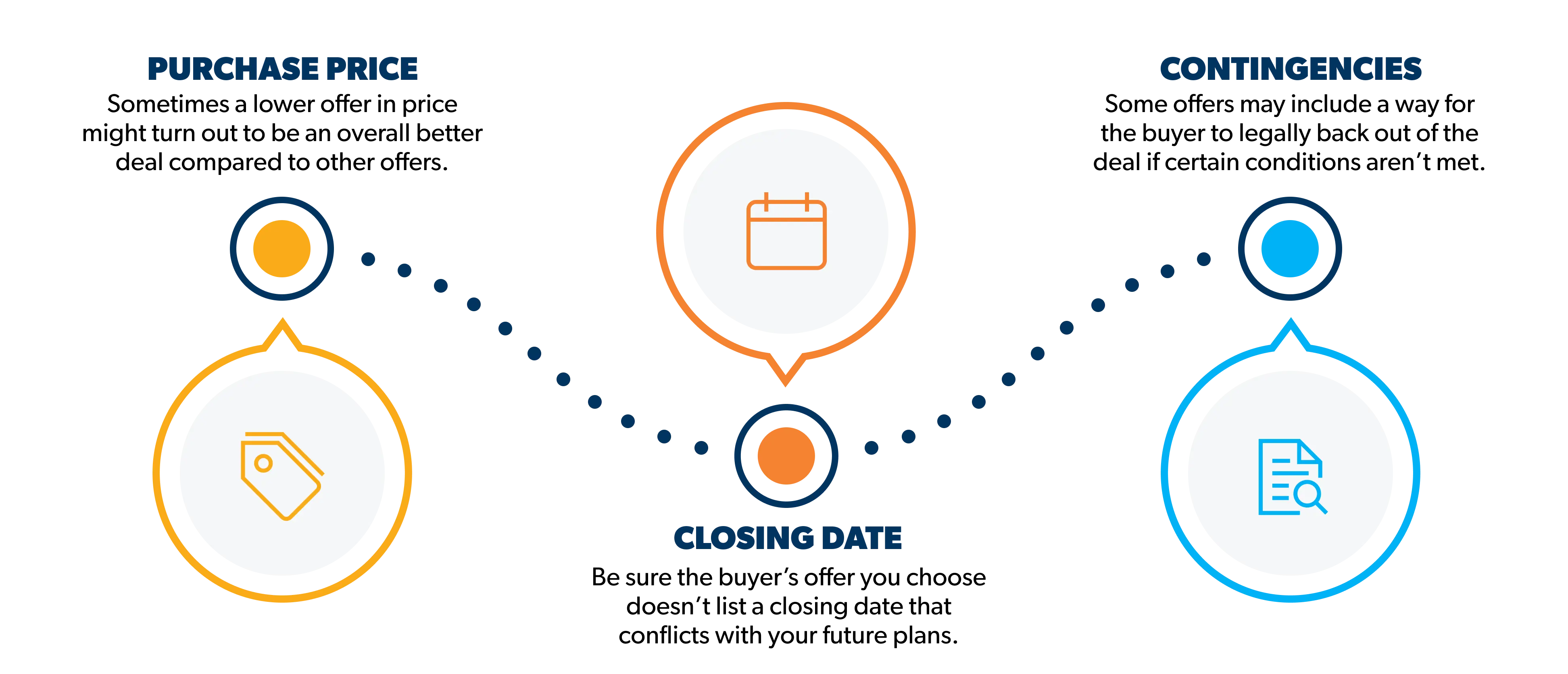
Choose the Right Offer
Congrats! Your open house was the talk of the neighborhood. You did such an awesome job staging that multiple buyers fell in love with your home and made you offers.
Now what?
By the time you finally get an offer, it’s tempting to sit back and coast through the contract stage. But that’s a bad idea. You worked too hard to blow it all now!
You don’t want to get stuck with a delayed closing date or worse—get less money than you deserve for your home. You need to choose the right offer.
Here’s what to focus on once someone says yes to your home sweet home.

What to Look For in an Offer
The purchase agreement kicks off the offer stage and sets the tone for the rest of the process. Your agent should explain the offer to you in simple terms so you understand what you’re agreeing to before you sign on the dotted line.
Pay close attention to these items:
- Purchase price: Don’t be surprised if you get offers that are lower than your asking price. Later we’ll share why sometimes a lower offer might turn out to be an overall better deal compared to other offers. And don’t forget, you can always negotiate.
- Closing date: Be sure the buyer’s offer you choose doesn’t list a closing date that conflicts with your future plans. You don’t want to be in a rush to move or have to wait so long to collect the money from your sale that it delays the purchase of your next home.
- Contingencies: We’ll cover more on contingencies later. But for now, be aware that some offers may include a way for the buyer to legally back out of the deal if certain conditions aren’t met—like the sale of the buyer’s current home or the results of a home inspection. Contingencies aren't a bad thing—but don’t agree to any you’re not comfortable with.

Weighing Your Offers
Remember, it’s important to look beyond the purchase price and take the whole package into account. For example, say your asking price is $250,000. A buyer offers to pay your full asking price but wants you to pay all of their closing costs plus throw in your washer and dryer. This part of the deal is usually described as seller concessions. Let’s say these seller concessions cost you $10,000. That means you’d net $240,000 from the deal.
Meanwhile, a second buyer offers $5,000 under your asking price without making any other special requests. This offer would net you $245,000—which turns out to be more money than the first offer.
Think of it this way: Even a low offer is an opportunity to get your home sold, so don’t take it personally. With some skillful negotiating, you can turn a disappointing offer into a deal where both sides win.
And whatever you do, be sure to read the contracts thoroughly. You don’t want to accidentally sign off on selling your brand-new washing machine and dryer with your house. Imagine doing that without realizing it and moving the machines to your new home. You’d end up having to pay to move them back to your previous home and buy new machines. That’d be really frustrating, and you’d have no one to blame but yourself. We don’t want that for you!
Even a low offer is an opportunity to get your home sold, so don’t take it personally. With some skillful negotiating, you can turn a disappointing offer into a deal where both sides win.
Trust Your Agent to Help You Negotiate
As you sort through your offers, don’t feel discouraged if buyers want to knock down your asking price. Trust your real estate agent to help you negotiate the best deal. Your agent will also have a better reading on whether a potential buyer could get you tangled up in contingencies or give you a smooth path toward closing. We’ve got more about contingencies coming up next.


